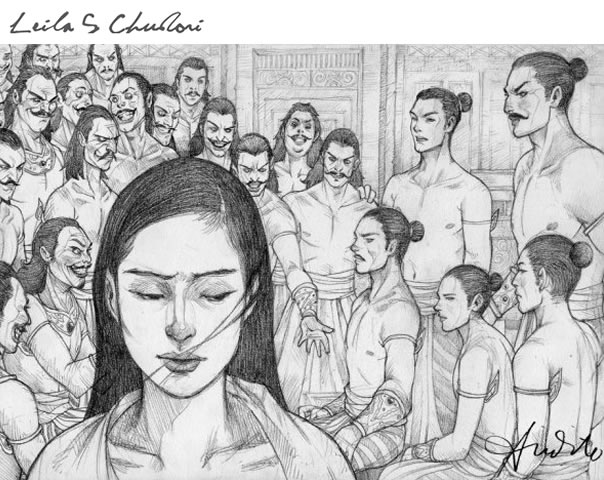Indonesische literatuur reanimeert het zwarte gat van 1965
http://historiek.net/indonesische-literatuur-reanimeert-het-zwarte-gat-van-1965/51378/
Niet zomaar een boek: een belevenis
http://indisch-anders.nl/helga-ruebsamen-leest-pulang-leila-s-chudori/#more-820
A Talk at 2013 Ubud Writers and Readers Festival
http://goenawanmohamad.com/2013/10/15/a-talk-at-2013-ubud-writers-and-readers-festival/
From The JAKARTA GLOBE, Oct 31, 2013: http://www.thejakartaglobe.com/opinion/ceritalah-longing-for-home
Ceritalah: Longing for Home
By Karim Raslan
Leila Chudori has written an epic. At over 456 pages (including footnotes), “Pulang” is an ambitious slab of fiction crammed with a rich and diverse cast of characters whose lives have been swept along by Indonesia’s dramatic and at times extremely tragic contemporary history.
However, this is not a dry, text-book account of the post-Independence era. While the rise, fall and bloody dismantling of the Indonesian Communist Party (PKI) is the engine driving the storytelling, Chudori — an experienced Tempo editor and film-reviewer — wisely chooses to focus her attention on a peripheral figure, Dimas Suryo — a flaneur, a happy-go-lucky journalist swept along by events.
Dimas is “Everyman”: he is a sensualist who loves his women but lacks the fortitude and gritty determination to hold onto them. Trapped abroad (in Paris) by a twist of fate just as the PKI is being hunted down, Dimas is forced to become a cook at an Indonesian restaurant called Tanah Air, channelling his creative energies and his desperate longing to return home into his food.
Chudori is a prodigious and impressive storyteller, switching the narrative between various characters across decades and continents. For example, we get to know Dimas as a father, a son, a husband, a loyal friend and feckless lover. (more…)
Review: Modern family
Leila S. Chudori’s latest novel raises poignant questions about family, home and belonging
Tineke Hellwig
What makes Leila S. Chudori’s 9 dari Nadira such an enjoyable read and an excellent piece of literature? This novel stands out because it touches upon a wide range of emotions and aspects of the human condition that readers easily recognise and with which they can empathise and identify. This work of fiction raises questions of what brings fulfilment in a person’s life. Reflecting the experiences of two generations of the Suwandi family it addresses the importance of education, a career and professional recognition in one’s life. It also explores how these correlate with marriage and intimate relationships. In addition it asks the extent monogamy and reproduction lead to happiness and whether motherhood is every woman’s calling. (more…)
Novel ‘Pulang’ Asks Tough Questions of Indonesia
The Jakarta Globe
By : Lisa Siregar
Poet and writer Sitok Srengenge pondered in silence as the spotlight slowly lit the stage at the auditorium of the Goethe-Institut, Jakarta, on Wednesday. His arms were crossed and his face was bearing the signs of a troubled mind. Then, slowly but surely, Sitok began to recite an excerpt from memory.
“The army is the disinfectant, and we were only bugs and dust that need to be swept off from the earth,” he said, reciting a sentence from “Pulang,” a new novel by journalist and film critic Leila Chudori.
“Pulang” is a story about love, hatred and betrayal that sheds light on two of Indonesia’s darkest periods in history — the 1965 and 1998 revolutions. In this story, “dust and bugs” refers to accused supporters of Indonesia’s Communist Party. Other than Sitok, the dramatic reading of the novel to celebrate the book launch at Goethe-Institut also featured actors Slamet Rahardjo, Ine Febriyanti, Reza Rahadian, Raline Shah and film director Joko Anwar. (more…)
(more…)
LEILA’S SAGA FOR THE LONELY DANCERS
 Pulang
Pulang
Leila S. Chudori
Kepustakaan Populer Gramedia, 2012
464 page
Review by Amahl S.Azwar-The Jakarta Post Sunday, January 06 2013,
“They’re dancing with the missing
They’re dancing with the dead
They dance with the invisible ones
Their anguish is unsaid.”
— “They Dance Alone”, Sting
There is a similarity between the grieving Chilean women described in the English musician’s protest song against the Chilean dictator Augusto Pinochet and the Indonesian political exiles blamed for the attempted coup in 1965.
The women in “They Dance Alone”, having lost their husbands and sons, are described as dancing the national dance of Chile alone with photographs of their vanished loved ones in their hands. (more…)

